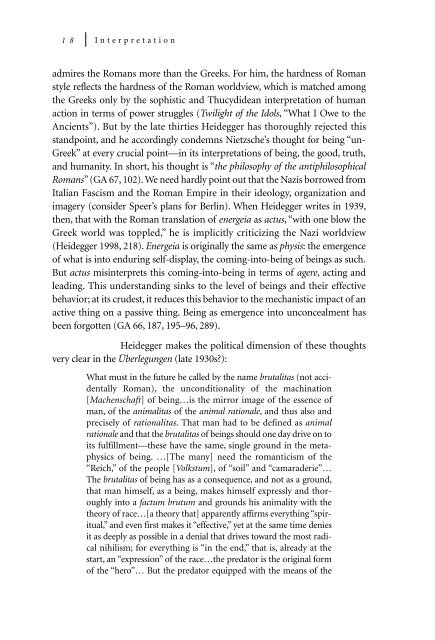Beyond Struggle and Power: Heidegger's Secret ... - Interpretation
Beyond Struggle and Power: Heidegger's Secret ... - Interpretation
Beyond Struggle and Power: Heidegger's Secret ... - Interpretation
You also want an ePaper? Increase the reach of your titles
YUMPU automatically turns print PDFs into web optimized ePapers that Google loves.
1 8 <strong>Interpretation</strong><br />
admires the Romans more than the Greeks. For him, the hardness of Roman<br />
style reflects the hardness of the Roman worldview, which is matched among<br />
the Greeks only by the sophistic <strong>and</strong> Thucydidean interpretation of human<br />
action in terms of power struggles (Twilight of the Idols, “What I Owe to the<br />
Ancients”). But by the late thirties Heidegger has thoroughly rejected this<br />
st<strong>and</strong>point, <strong>and</strong> he accordingly condemns Nietzsche’s thought for being “un-<br />
Greek” at every crucial point—in its interpretations of being, the good, truth,<br />
<strong>and</strong> humanity. In short, his thought is “the philosophy of the antiphilosophical<br />
Romans” (GA 67, 102). We need hardly point out that the Nazis borrowed from<br />
Italian Fascism <strong>and</strong> the Roman Empire in their ideology, organization <strong>and</strong><br />
imagery (consider Speer’s plans for Berlin). When Heidegger writes in 1939,<br />
then, that with the Roman translation of energeia as actus, “with one blow the<br />
Greek world was toppled,” he is implicitly criticizing the Nazi worldview<br />
(Heidegger 1998, 218). Energeia is originally the same as physis: the emergence<br />
of what is into enduring self-display, the coming-into-being of beings as such.<br />
But actus misinterprets this coming-into-being in terms of agere, acting <strong>and</strong><br />
leading. This underst<strong>and</strong>ing sinks to the level of beings <strong>and</strong> their effective<br />
behavior; at its crudest, it reduces this behavior to the mechanistic impact of an<br />
active thing on a passive thing. Being as emergence into unconcealment has<br />
been forgotten (GA 66, 187, 195–96, 289).<br />
Heidegger makes the political dimension of these thoughts<br />
very clear in the Überlegungen (late 1930s?):<br />
What must in the future be called by the name brutalitas (not accidentally<br />
Roman), the unconditionality of the machination<br />
[Machenschaft] of being…is the mirror image of the essence of<br />
man, of the animalitas of the animal rationale, <strong>and</strong> thus also <strong>and</strong><br />
precisely of rationalitas. That man had to be defined as animal<br />
rationale <strong>and</strong> that the brutalitas of beings should one day drive on to<br />
its fulfillment—these have the same, single ground in the metaphysics<br />
of being. …[The many] need the romanticism of the<br />
“Reich,” of the people [Volkstum], of “soil” <strong>and</strong> “camaraderie”…<br />
The brutalitas of being has as a consequence, <strong>and</strong> not as a ground,<br />
that man himself, as a being, makes himself expressly <strong>and</strong> thoroughly<br />
into a factum brutum <strong>and</strong> grounds his animality with the<br />
theory of race…[a theory that] apparently affirms everything “spiritual,”<br />
<strong>and</strong> even first makes it “effective,” yet at the same time denies<br />
it as deeply as possible in a denial that drives toward the most radical<br />
nihilism; for everything is “in the end,” that is, already at the<br />
start, an “expression” of the race…the predator is the original form<br />
of the “hero”… But the predator equipped with the means of the
















